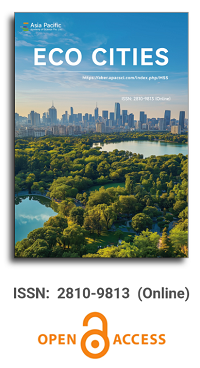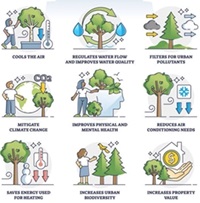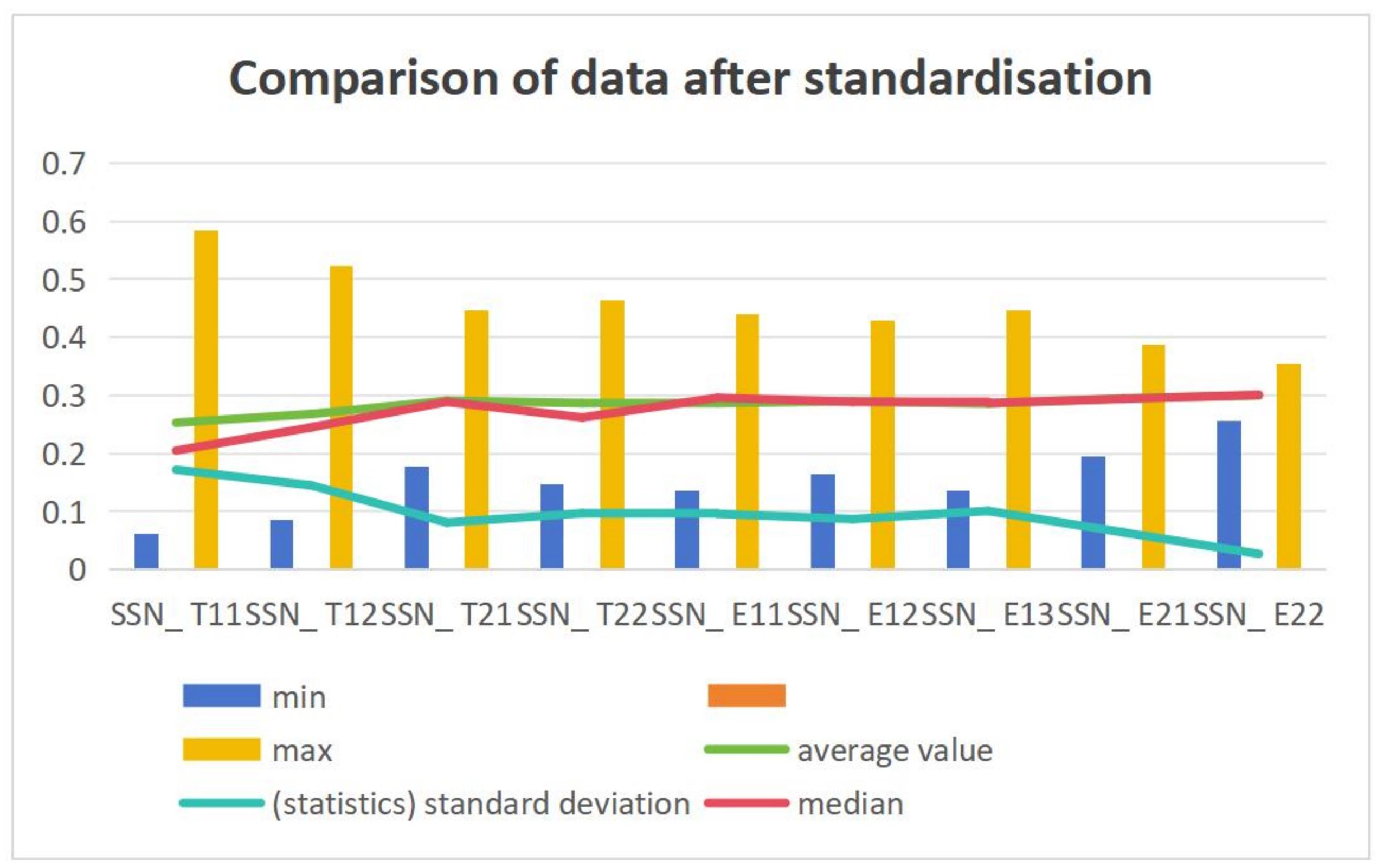


Welcome to Volume 5, Issue 1 of Eco Cities. This issue will present research how cities deal with environmental pollution and climate change. These articles propose innovative solutions for governing urban environments and addressing climate change, and some of these solutions make use of advanced technologies such as the Internet of Things, thereby contributing to the improvement of urban environments, management, and residents' quality of life.
Issue release: 30 June 2024
This paper presents a report as part of a comprehensive study on the utilization of some forms of solid waste (SW) to make charcoal briquettes (CB) as an alternative fuel source in communities that are reliant upon traditional charcoal (TC) and wood as the primary cooking fuels. The study coincides with the Tanzanian government’s efforts to diminish reliance on wood and charcoal as a primary fuel source, particularly for large-scale consumers. Nevertheless, the government restriction on TC usage comes with little or no presentation of alternative sources that are both eco-friendly and economically sustainable. Introducing the mechanism that meets both environmental and economic criteria, the study employs a cross-sectional approach to collect the required data and uses experimental methods to evaluate the performance of the produced CB. Such tests focused on cooking duration, burning rate (BR), specific fuel consumption (SFC), and the general efficiency expressed by the percentage of heat utilized (PHU). In most cases, CB performs by far or less well than TC. Such results make the study important as it develops clean cooking technologies to solve the existing fuel crisis and improve health and environmental conditions from SW pollution while reducing deforestation, subsequent desertification, and climate change for sustainable environmental conservation.
Issue release: 30 June 2024
With the acceleration of urbanization and the intensification of environmental issues, China is actively transitioning to a digital green economy development model, covering the application of digital technologies, sustainable economies, environmental protection, green infrastructure and transportation, digital management, and social inclusion. The model aims to improve urban efficiency through digital innovation, reduce resource waste, achieve a balance between economic growth and environmental protection, and improve residents’ quality of life. Despite some progress, challenges remain, such as the digital divide, financial pressures, and inadequate environmental regulation. This paper selects the data from 2008 to 2022 for research and uses Eviews software to conduct multiple linear regression analysis and testing. It aims to explore the application of digital technology in urban management, promote the development of the green economy, and analyze and improve the problems in the digital green economy so as to promote sustainable urban development.
Issue release: 30 June 2024
Under China’s ambitious goal of peaking carbon dioxide emissions by 2030 and achieving carbon neutrality by 2060, we should re-examine the way of urban development, study the key to carbon pollution, change the original urban renewal path, and seek energy-saving and emission reduction. Therefore, this paper takes Xiamen City as an example, through questionnaire survey, mathematical statistics analysis and other methods, combined with the practice of low-carbon city and ecological civilization construction in Xiamen City, this paper makes an in-depth analysis of carbon pollution problems such as transportation carbon emissions, domestic waste disposal carbon emissions and industrial waste carbon emissions in Xiamen City, and puts forward the urban renewal path of Xiamen City to effectively reduce carbon emissions based on the concept of carbon neutrality, which provides a low-carbon plan for Xiamen City’s urban renewal and is of great significance for Xiamen City to achieve the dual-carbon goal.
Issue release: 30 June 2024
This article explores the integration of Eco Cities and Smart Regions to create sustainable and innovative urban environments. Eco Cities focus on environmental sustainability through renewable energy, waste management, and green infrastructure, aiming to reduce ecological footprints and promote healthy lifestyles. Smart Regions, on the other hand, utilize advanced technologies such as the Internet of Things (IoT), artificial intelligence (AI), and big data analytics to enhance public service efficiency, optimize resource use, and foster economic development. The study highlights how combining these two approaches can lead to significant benefits, including improved operational efficiency, better quality of life, environmental resilience, and active citizen participation. Case studies of cities like Copenhagen and Singapore demonstrate successful integration, showcasing achievements in sustainability and technological innovation. The article also identifies the main challenges in this integration, including technical compatibility, cybersecurity risks, high initial investments, digital inequality, and the need for robust governance frameworks. Overcoming these challenges requires collaborative efforts among governments, private sectors, and civil society, as well as innovative financing strategies and capacity-building programs. Future considerations emphasize the need for a holistic approach to urban planning that incorporates emerging technologies, flexible and adaptive strategies, and inclusive citizen engagement. By addressing these factors, cities and regions can become more resilient, sustainable, and inclusive, meeting the needs of both current and future generations. This integrated approach promises to transform urban environments into hubs of sustainability and innovation, driving long-term positive outcomes for society and the environment.
Issue release: 30 June 2024
India as a country has its identity deeply rooted in its rural culture. Whether we talk about agriculture, tradition, food, art, or music, the rural society of India has always proven itself a representation towards the national front. The Dayalbagh society in Agra city of Uttar Pradesh (India) is engaged to strengthen the nation’s roots through education, technology, sustainability, management, innovation, research, and most importantly, selfless service. The major potential for economic growth in India lies in the development of its rural areas. This article is an attempt to spot the outlook of a society that has its inception for the past 100 years and is continuously making efforts to glorify the message of sustainable development, environmental protection, and rural development through its effective plans in designing an eco-village-based society. Based on the narrative description approach, this article highlights the efforts and strategies employed by the Dayalbagh society to promote sustainable development, environmental protection, and rural development. The focus is on how society integrates education, technology, sustainability, management, innovation, research, and selfless service to achieve these goals. The Dayalbagh society’s initiatives have taken into consideration economic, social, environmental, and human aspects, demonstrating significant contributions towards sustainable development and rural empowerment. The philosophy and successful practices of the Dayalbagh society can inspire and guide others in developing action plans for effective environmental protection and sustainable rural development. By adopting such approaches, other organizations, decision-makers, and individuals can contribute to the overall growth and well-being of rural areas in India.
Issue release: 30 June 2024
The exacerbation of climate change impacts within metropolitan areas is a well-documented phenomenon, often leading to severe consequences that pose significant risks to human populations. The impact of urban vegetation and planting design on these factors can be observed. However, it is worth mentioning that while there is an extensive body of literature on the consequences of climate change, there is a relatively small number of studies specifically focused on examining the role of vegetation as a mitigating factor in urban environments. This review paper aims to critically examine existing studies pertaining to the role of urban vegetation in mitigating the detrimental effects of the urban environment. The objective is to offer practical recommendations that can be implemented by city planners. By conducting a comprehensive examination of the literature available in Scopus, Web of Science, and Google Scholar, employing specific keywords pertaining to urban vegetation and climate change, we have identified five prominent concerns pertaining to the urban environment. These concerns encompass particulate matter, gaseous pollution, noise pollution, water runoff, and the urban heat island effect. The present analysis highlights that the impact of urban vegetation on the negative consequences of climate change cannot be unequivocally classified as either positive or negative. This is due to the fact that the influence of urban greenery is intricately connected to factors such as the arrangement, makeup, and dispersion of vegetation, as well as the specific management criteria employed. Hence, this research has the potential to enhance comprehension of the multifaceted nature of urban green spaces and establish a solid groundwork for subsequent investigations.
Issue release: 30 June 2024
Under the background of climate warming, the importance of global carbon emission management has become more and more significant. This article reviews and organizes the existing literature on carbon emission management, focusing on the research status from the perspectives of economic instruments for carbon reduction and international cooperation. It explores the economic effects of different policy tools and the emission reduction measures of various countries. This article intends to see the progress and shortcomings of global climate governance through the organization of past research results and provide directions for future research.
Issue release: 30 June 2024
This opinion article delves into the critical role of nature-based solutions (NbS) for climate change mitigation. Despite their recognized potential, the multifaceted challenges of NbS remain complex and under-explored. Both potential and limitations are discussed, including economic, social, and political considerations. The importance of an interdisciplinary approach and adaptation to diverse socioeconomic and cultural contexts to ensure equitable implementation of NbS is highlighted. This brief but critical perspective seeks to enrich the academic view and provide actionable insights for urban planners and policymakers. Finally, it proposes directions for future studies for researchers in the fields of sustainable urban development and climate change mitigation.

Chinese Academy of Sciences, China
Indexing & Archiving
Asia Pacific Academy of Science Pte. Ltd. (APACSCI) specializes in international journal publishing. APACSCI adopts the open access publishing model and provides an important communication bridge for academic groups whose interest fields include engineering, technology, medicine, computer, mathematics, agriculture and forestry, and environment.


 Open Access
Open Access

.jpg)

.jpg)



